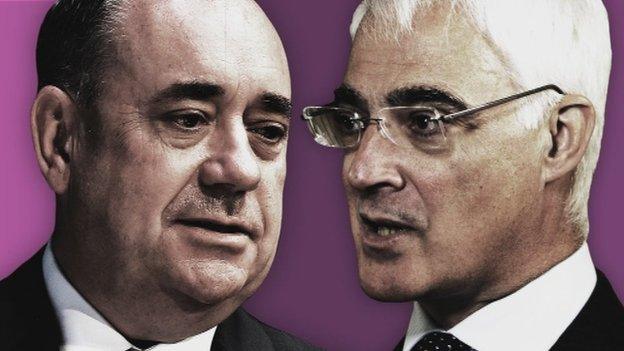Kilts, cold water and poetry
- Published
BBC Scotland's political editor Brian Taylor does the ice bucket challenge after being nominated by First Minister Alex Salmond.
So how was your weekend? Saturday went swimmingly for me with a thoroughly deserved victory by the mighty Dundee United over a gallant Ross County.
OK, it was a late goal - but it was a powerfully hit late goal. Well done the lads.
Then to Sunday. In order, I sorted out a kilt for my elder son's wedding; I was doused in ice-cold water by my younger son and his girlfriend; then we attended a poignant and witty poetic performance by the magnificent Ron Butlin on the Fringe. With charming musical accompaniment.
The kilt? Black Watch. Other than for a TV documentary, it is the first time I have donned the full tartan since I was a very youthful page boy at a family wedding. Pictures of which, I trust, have been suppressed. One can only hope for a sympathetic gathering on the day.
Televised debate
The water? For the ice bucket challenge, as requested by Alex Salmond. As prompted by both Mr Salmond and Alistair Darling, I have today made a donation to support research into Motor Neurone Disease.
The performance? Insightful poetry plus a dose of prose from Ron, the former Edinburgh Makar. Much of it referring, obliquely and directly, to the referendum. The choice, the popular engagement, the prospect of division, the objective of healing.
Most of these facets and more besides, I guess, will be on display tonight for the televised debate between Mr Salmond and Mr Darling.
I have noted previously that I do not believe such debates will be utterly decisive. The people of Scotland will make up their minds, individually, on the basis of a range of motivations, mostly linked to their personal predilections and concerns.
However, tonight's debate arrives at a particularly apposite moment.

The format

Mr Salmond and Mr Darling will debate
The broadcast will be split up into four sections....
SECTION ONE: Opening statements - Alex Salmond will go first, Alistair Darling second. (Mr Salmond won the coin toss and elected to go first).
SECTION TWO: The issues- The two men will debate four topics titled;
Economy
Scotland at Home
Scotland in the World
What Happens after the Vote
(Each will be introduced with a question from the audience.)
SECTION THREE: Cross-examination - Alistair Darling will go first, Alex Salmond second. (Mr Darling won the coin toss and elected to go first).
SECTION FOUR: Closing statements - Alex Salmond will go first, Alistair Darling second. (Mr Darling opted to go second).

Firstly, it is just before the postal ballots go out. In Scotland, 680,235 were registered for a postal vote at the latest count. That is a tad more than 16% of the total number registered to vote.
Most postal voters, it is thought, mark their ballot papers on receipt. So, for many people, this debate is on the very eve of polling.
Secondly, after a very long campaign indeed, we are about to enter the short, final phase of this remarkable contest.
The tone inevitably changes. It is about reinforcing identified support, winning votes from the undecided or the other side - and ensuring turnout.
Time-lapse video shows preparations for the BBC's referendum leaders' debate.
The Yes camp divided the long campaign into "can, should and must": three phases of approaching the people of Scotland. We are about to embark upon the period where the supporters of independence will argue that voters "must" vote Yes in order to sustain and advance Scotland's interests.
Inevitably, that will involve a degree of dissing the rival offer, of arguing that preserving the Union carries intrinsic risk for Scotland. That is why Mr Salmond has focused upon the future of public spending and, in particular, the NHS, to the fury of his opponents.
Expect more of that tonight from Alex Salmond, alongside his arguments for the advantages of independence.
It should come as no surprise to anyone that Better Together have had a substantial negative facet to their campaign from the outset. They are seeking to negate a proposition. Ultimately, they are seeking to secure a No vote. That involves, de facto, being a little impolite about the independence prospectus.
Psychological motivation
At the same time, they stress they are seeking to project the positive appeal of the Union. That is why we hear talk of a No vote being the "patriotic" option for people in Scotland. That is why we have heard talk from the very beginning of a No vote offering "the best of both worlds".
There is a third factor in play tonight. That is political and psychological motivation. A perception of success or otherwise in televised debates can energise or depress the street canvassers who are simply critical to this contest where it is the aggregate Scottish total which matters. Where, literally, every vote counts.
Alex Salmond is widely reckoned to have "lost" the first debate - although that can be exaggerated and it does not appear that there was a direct or lasting impact on the polls.
However, in terms of perception, Mr Salmond "needs" a victory tonight - or at least a palpably better performance than last time out. Mr Darling, I suspect, will be happy with a scoring draw.
So tonight will be highly significant. Remember, though, that the winner will be an argument, not an individual. And that will be declared on September the 19th.